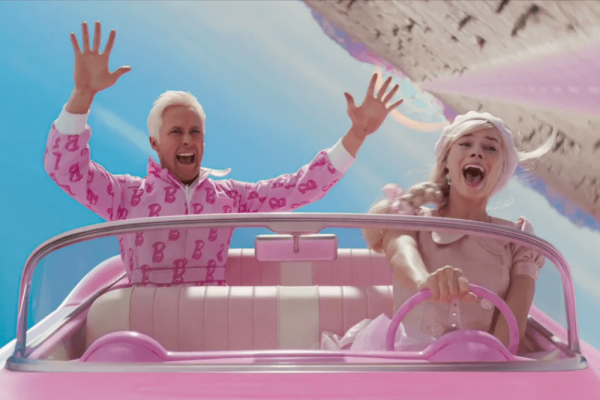In the beginning, Ruth Handler created Barbieland. And Ruth said, “Let there be pink,” and there was pink. There was Barbie and then there was Ken. Then Barbie had a blowout party with all the other Barbies and planned choreography and a bespoke song.
Writer/director Greta Gerwig’s Barbie subverts the creation story, transporting us to a different type of Garden of Eden. We meet Gerwig’s Adam and Eve figures: Stereotypical Barbie, played by Margot Robbie, and Ken, played by Ryan Gosling. Here, the Barbies are created first, and Ken was created to be ornamental. The pair is placed in Barbieland, where everything is perfect, where they have the best day ever, every single day.
Except Ken only has a good day when Barbie acknowledges him. All of the Kens compete with each other for the Barbies’ attention. They wear hats and hold binoculars and ice cream cones. They’re the cheerleaders at the Barbies’ volleyball games and they’re the cheerleaders in life. But the Barbies hold all positions of power. The Barbies are doctors, astronauts, writers, construction workers, presidents, and Supreme Court justices. “Thanks to Barbie, all problems of feminism and equal rights have been solved, at least that’s what the Barbies think,” narrator Helen Miren says.
But when Stereotypical Barbie suddenly asks if any of the other Barbies ever think about death, the other Barbies are horrified. In Barbieland, there is no death.
Barbie tries to shake off her thoughts of death, but when she wakes up the next day, something has changed. Things are burnt, spoiled, smelly, cold, flat. To find out what might be going wrong, Stereotypical Barbie goes to meet with Weird Barbie, a Barbie who has been played with a bit too harshly (as evidenced by the marker scribbles on her face and her unhinged haircut). Played by Kate McKinnon, Weird Barbie is something of a prophetic figure; she guides Stereotypical Barbie’s path forward. To fix everything, Barbie must leave Barbieland and go to the real world (via sports car, speedboat, rocket ship, tandem bike, camper van, snowmobile, and neon rollerblades).
In exile, Barbie (and Ken, who tagged along) discover that the real world is far different than Barbieland. Like Adam and Eve post-forbidden-fruit-eating, Barbie experiences shame. “I feel kind of ill at ease … I’m conscious but it’s myself that I’m conscious of,” she says.
When Barbie meets tween Sasha, played by Ariana Greenblatt, Sasha tells Barbie, “You’ve been making women feel bad about themselves since you were invented.”
Confused and hurt, Barbie says, “Barbie is so much more than that.” Barbies, she thought, were meant to show women and girls that anything was possible.
The Bible is a lot like Barbieland. Both are full of complicated, often misunderstood women. And both Gerwig’s Genesis story and the Bible push us to question: What does it mean to be a woman? Unsurprisingly, the answer — in both — is complex.
The Bible is full of figures who have caused trouble for women and girls. Some stories — like the violence inflicted on Jepthath’s daughter or Lot’s daughters — are unimaginable today; other stories, like Ruth’s faithfulness, Mary’s obedience, and the Proverbs 31 woman’s everythingness, are all too familiar. And then there’s Paul, whose letters to first-century churches are cited to silence women in churches even to this day.
The late author Rachel Held Evans, writes in A Year of Biblical Womanhood, “As much as we may long for the simplicity of a single definition of ‘biblical womanhood,’ there is no right way to be a woman, no mold into which we must cram ourselves.” There is no Stereotypical Bible Barbie.
Evans continues, “What makes these women’s stories leap from the page is not the fact that they all conform to some kind of universal ideal, but that, regardless of the culture or context in which they found themselves, they lived their lives with valor. They lived their lives with faith.”
I hear echoes of Evans words in the climatic monologue of Sasha’s mom Gloria, played by America Ferrera. “It is literally impossible to be a woman,” she says. “You have to never get old, never be rude, never show off, never be selfish, never fall down, never fail, never show fear, never get out of line.” Continuing, “I’m just so tired of watching myself and every single other woman tie herself into knots so that people will like us.”
Near the end of the film, Barbie tells Ruth Handler, the creator of Barbie, that she wants to be human.
“I want to be a part of the people that make meaning, not the thing that’s made,” Barbie says. “I want to do the imagining, not be the idea.”
Barbie doesn’t know how to be human. None of us do. But we do know how to take a deep breath, how to weep, how to feel, and how to make meaning on the way. That’s all there really is to it, according to Handler. The very act of trying is the characteristic that makes us human, which points us back to the women of the Bible.
Give us those Barbies — the disobedient ones, the ones with complicated questions and burning anger. Give us the ones whom God has called for greatness. Give us Miriam and Deborah and Vashti and Delilah and Eve and Mary. Give us Barbie.
Got something to say about what you're reading? We value your feedback!







